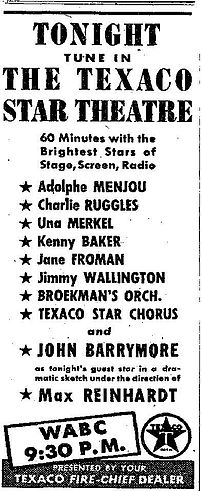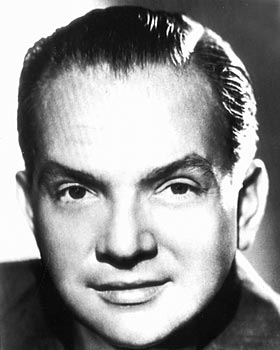Related Research Articles

The DuMont Television Network was one of America's pioneer commercial television networks, rivaling NBC and CBS for the distinction of being first overall in the United States. It was owned by Allen B. DuMont Laboratories, a television equipment and television set manufacturer & broadcasting company. DuMont was founded in 1940 and began operation on August 15, 1946.

Lester Raymond Brown was an American jazz musician who for over six decades (1938-2000) led his big band, later called Les Brown and His Band of Renown.
The year 1967 in television involved some significant events. Below is a list of television-related events in 1967.
The year 1958 in television involved some significant events. Below is a list of television-related events during 1958.
The year 1957 in television involved some significant events. Below is a list of television-related events during 1957.
The year 1955 in television involved some significant events. Below is a list of television-related events during 1955.
The year 1954 in television involved some significant events. Below is a list of television-related events in 1954.
The year 1953 in television involved some significant events. Below is a list of television-related events during 1953.

Texaco Star Theater is an American comedy-variety show, broadcast on radio from 1938 to 1949 and telecast from 1948 to 1956. It was one of the first successful examples of American television broadcasting, remembered as the show that gave Milton Berle the nickname "Mr. Television".

Mark Leo Goodson was an American television producer who specialized in game shows, most frequently with his business partner Bill Todman, with whom he created Goodson-Todman Productions.

WWNY-TV is a television station licensed to Carthage, New York, United States, serving as the CBS affiliate for the Watertown area. It is owned by Gray Television alongside low-power, Class A Fox affiliate WNYF-CD. The two stations share studios on Arcade Street in downtown Watertown; WWNY-TV and WNYF-CD's transmitters are located on the same tower along NY 126/State Street on Champion Hill.
The Voice of Firestone was a radio and television program of classical music. The show featured leading singers in selections from opera and operetta. Originally titled The Firestone Hour, it was first broadcast on the NBC Radio network on December 3, 1928 and was later also shown on television starting in 1949. The program was last broadcast in 1963.
KDKA-TV, also known as CBS Pittsburgh, is a television station in Pittsburgh, Pennsylvania, United States, serving as the market's CBS outlet. It is owned and operated by the network's CBS News and Stations division alongside Jeannette-licensed WPKD-TV, an independent station. The two stations share studios at the Gateway Center in Downtown Pittsburgh; KDKA-TV's transmitter is located in the city's Perry North neighborhood. KDKA-TV, along with sister station KYW-TV in Philadelphia, are the only CBS-affiliated television stations east of the Mississippi River with "K" call signs.

Bert Parks was an American actor, singer, and radio and television announcer, best known for hosting the annual Miss America telecast from 1955 to 1979.
Information Please is an American radio quiz show, created by Dan Golenpaul, which aired on NBC from May 17, 1938, to April 22, 1951. The title was the contemporary phrase used to request from telephone operators what was then called "information" and later called "directory assistance".

WTNH is a television station licensed to New Haven, Connecticut, United States, serving the Hartford–New Haven market as an affiliate of ABC. It is owned by Nexstar Media Group alongside MyNetworkTV affiliate WCTX, also licensed to New Haven. WTNH and WCTX share studios on Elm Street in downtown New Haven; per a channel sharing agreement, the two stations transmit using WTNH's spectrum from a tower in Hamden, Connecticut.
WTKR is a television station licensed to Norfolk, Virginia, United States, serving the Hampton Roads area as an affiliate of CBS. It is owned by the E. W. Scripps Company alongside Portsmouth-licensed WGNT, an independent station. The two stations share studios on Boush Street near downtown Norfolk; WTKR's transmitter is located in Suffolk, Virginia.

Benjamin Franklin Grauer was an American radio and television personality, following a career during the 1920s as a child actor in films and on Broadway. He began his career as a child in David Warfield's production of The Return of Peter Grimm. Among his early credits were roles in films directed by D.W. Griffith.

The Paramount Television Network, Inc. was a venture by American film corporation Paramount Pictures to organize a television network in the late 1940s. The company-built television stations KTLA in Los Angeles and WBKB in Chicago; it also invested $400,000 in the DuMont Television Network, which operated stations WABD in New York City, WTTG in Washington, D.C., and WDTV in Pittsburgh. Escalating disputes between Paramount and DuMont concerning breaches of contract, company control, and network competition erupted regularly between 1940 and 1956, culminating in the DuMont Network's dismantling. Television historian Timothy White called the clash between the two companies "one of the most unfortunate and dramatic episodes in the early history of the television industry."
References
- ↑ Rich, Allen (1948-03-08). "The Listening Post". Valley Times. p. 12. Retrieved 2020-10-12.
- ↑ "Audio and Video: Strangers to Air Browns Games". The Akron Beacon Journal. 1952-07-25. p. 34. Retrieved 2020-10-12.
- 1 2 Alex McNeil, "Stop the Music", Total Television: The Comprehensive Guide to Programming from 1948 to the Present, 4th ed., New York: Penguin Books, 1996, p. 792
- ↑ "Radio-TV Day by Day". The Times. 1949-04-01. p. 22. Retrieved 2020-10-12.
- ↑ "Cowan-Packaged Show Starts on ABC in March" (PDF). Broadcasting. February 2, 1948. p. 20. Retrieved 19 August 2016.
- ↑ Steinhauser, Si (1948-05-03). "They Wouldn't Talk Business But 'Stop The Music'". The Pittsburgh Press. p. 27. Retrieved 2020-10-12.
- ↑ "FCC Bans Give-Away Radio Shows". The Miami Herald. 1949-08-20. p. 1. Retrieved 2020-10-10.
- 1 2 "FCC v. American Broadcasting Co., Inc., 347 U.S. 284 (1954)". Justia Law. Retrieved 2020-10-12.
- ↑ "ClassicTVguide.com: TV Ratings". classictvguide.com.
- ↑ McNeil, Total Television, network television schedule